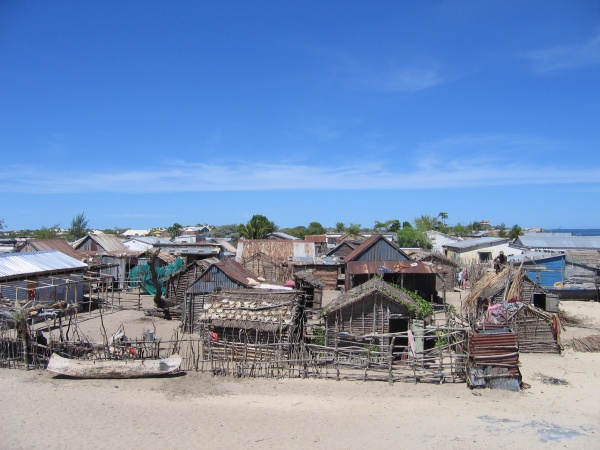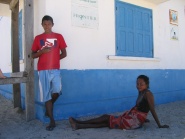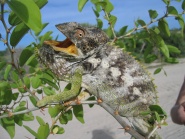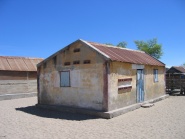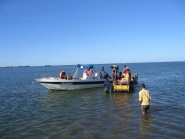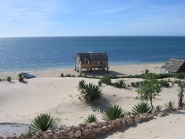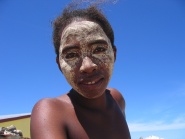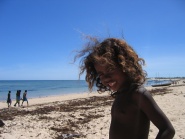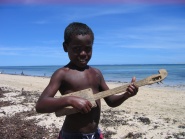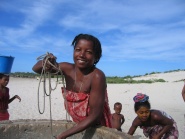Difference between revisions of "Anakao"
CampMaster (talk | contribs) |
CampMaster (talk | contribs) |
||
| Line 1: | Line 1: | ||
| − | Anakao is a small beautiful Vezo village situated on a long stretched beach about 40km south of Tulear, where life is very very relaxed. | + | '''Anakao is a small beautiful Vezo village situated on a long stretched beach about 40km south of Tulear, where life is very very relaxed.''' |
| + | |||
| + | [[File:Anakao_00055.jpg|thumb|left|600px|Central part of Anakao village]] | ||
| + | |||
| + | Due to the bad road condition, the village is best reached by boat from Tulear, which can take about 1-2 hours. During low tide, the transfer begins with a short oxcard ride onto the seabead to reach the pirogue or motorboat. The various hotels in Anakao provide a transfer which can be booked in Tulear harbour from where the boat leaves. | ||
| − | |||
A few basic hotels are strewn over the coastline of the village. These are mostly beach huts, providing a life on the beach experience. Early in the morning countless pirogues can be seen leaving the direction of the open ocean for fishing and return with their catch in the afternoon. | A few basic hotels are strewn over the coastline of the village. These are mostly beach huts, providing a life on the beach experience. Early in the morning countless pirogues can be seen leaving the direction of the open ocean for fishing and return with their catch in the afternoon. | ||
| + | |||
| + | <table cellpadding="0" cellspacing="0" border="0" style="margin-right:10px;"><tr> | ||
| + | <td valign="top">[[Image:Anakao_00006.jpg|185px|none|thumb|Relaxing villagers]]</td> | ||
| + | <td valign="top">[[Image:Anakao_00040.jpg|185px|none|thumb|Unidentified chameleon]]</td> | ||
| + | <td valign="top">[[Image:Anakao_00003.jpg|185px|none|thumb|Anakao 'city centre']]</td></tr></table> | ||
Behind the village are some tombs, decorated with oars/rudders or zebu horns in memory of the dead. South of the village fragments of eggshells of the world's largest bird, the now extinct Aepyornis or elephant bird, can be found (it is illegal to take them out of the country). | Behind the village are some tombs, decorated with oars/rudders or zebu horns in memory of the dead. South of the village fragments of eggshells of the world's largest bird, the now extinct Aepyornis or elephant bird, can be found (it is illegal to take them out of the country). | ||
| − | The small uninhabited islands of [[Nosy Ve]] and [[Nosy Satrana]] are located just outside of Anakao which are popular destinations for day visitors. | + | <table cellpadding="0" cellspacing="0" border="0" style="margin-right:10px;"><tr> |
| + | <td valign="top">[[Image:Anakao_00052.jpg|185px|none|thumb|Oxcart to boat transfer from Tulear]]</td> | ||
| + | <td valign="top">[[Image:Anakao_00050.jpg|185px|none|thumb|Anakao beach hut]]</td> | ||
| + | <td valign="top">[[Image:Anakao_00002.jpg|185px|none|thumb|Vezo woman with typical face make up]]</td></tr> | ||
| + | <tr> | ||
| + | <td valign="top">[[Image:Anakao_00001.jpg|185px|none|thumb|Vezo child at Anakao beach]]</td> | ||
| + | <td valign="top">[[Image:Anakao_00010.jpg|185px|none|thumb|Young Vezo guitarist]]</td> | ||
| + | <td valign="top">[[Image:Anakao_00042.jpg|185px|none|thumb|Communal water hole at Anakao]]</td> | ||
| + | </tr></table> | ||
| + | |||
| + | The small uninhabited islands of [[Nosy Ve]] and [[Nosy Satrana]] are located just outside of Anakao which are popular destinations for day visitors that can be reached by a short pirogue ride from the mainland. | ||
| + | |||
<!-- | <!-- | ||
| − | |||
| − | |||
<googlemap version="0.9" lat="-23.659059" lon="43.646268" zoom="17" controls="large"> | <googlemap version="0.9" lat="-23.659059" lon="43.646268" zoom="17" controls="large"> | ||
-23.659511, 43.646708 | -23.659511, 43.646708 | ||
| Line 19: | Line 36: | ||
[[Image:Anakao_00021.jpg|left|70px]]Bungalow | [[Image:Anakao_00021.jpg|left|70px]]Bungalow | ||
</googlemap> | </googlemap> | ||
| + | --> | ||
| + | == Accommodation == | ||
| + | * | ||
| + | * | ||
| + | * | ||
| − | |||
| − | |||
| − | |||
| − | |||
| − | |||
| − | |||
| − | |||
| − | |||
| − | |||
| − | |||
| − | |||
| − | |||
| − | |||
| − | |||
| − | |||
| − | |||
| − | |||
| − | |||
| − | |||
| − | |||
| − | |||
| − | |||
| − | |||
| − | |||
| − | |||
| − | |||
| − | |||
| − | |||
| − | |||
| − | |||
| − | |||
| − | |||
| − | |||
| − | |||
| − | |||
| − | |||
| − | |||
| − | |||
| − | |||
| − | |||
| − | |||
| − | |||
| − | |||
| − | |||
| − | |||
| − | |||
| − | |||
| − | |||
| − | |||
| − | |||
| − | |||
| − | |||
| − | |||
| − | |||
| − | |||
| − | |||
| − | |||
| − | |||
| − | |||
| − | |||
| − | |||
| − | |||
| − | |||
| − | |||
| − | |||
| − | |||
| − | |||
| − | |||
| − | |||
| − | |||
| − | |||
| − | |||
| − | |||
| − | |||
| − | |||
| − | |||
| − | |||
| − | |||
| − | |||
| − | |||
| − | |||
| − | |||
| Line 109: | Line 49: | ||
== Further information == | == Further information == | ||
| + | * [[Images_of_Anakao|See more images of Anakao]] | ||
* [http://www.madagascar-library.com/r/709.html Anakao map illustration info at madagascar-library.com] | * [http://www.madagascar-library.com/r/709.html Anakao map illustration info at madagascar-library.com] | ||
** [http://www.madagascar-library.com/images/700x700/anakao-map-daniel-austin-front.jpg Direct link to the madagascar-library.com map graphic itself] | ** [http://www.madagascar-library.com/images/700x700/anakao-map-daniel-austin-front.jpg Direct link to the madagascar-library.com map graphic itself] | ||
* [http://www.lonelyplanet.com/madagascar/southern-madagascar/anakao-and-nosy-ve Anakao on Lonely Planet] | * [http://www.lonelyplanet.com/madagascar/southern-madagascar/anakao-and-nosy-ve Anakao on Lonely Planet] | ||
Revision as of 17:51, 24 March 2009
Anakao is a small beautiful Vezo village situated on a long stretched beach about 40km south of Tulear, where life is very very relaxed.
Due to the bad road condition, the village is best reached by boat from Tulear, which can take about 1-2 hours. During low tide, the transfer begins with a short oxcard ride onto the seabead to reach the pirogue or motorboat. The various hotels in Anakao provide a transfer which can be booked in Tulear harbour from where the boat leaves.
A few basic hotels are strewn over the coastline of the village. These are mostly beach huts, providing a life on the beach experience. Early in the morning countless pirogues can be seen leaving the direction of the open ocean for fishing and return with their catch in the afternoon.
Behind the village are some tombs, decorated with oars/rudders or zebu horns in memory of the dead. South of the village fragments of eggshells of the world's largest bird, the now extinct Aepyornis or elephant bird, can be found (it is illegal to take them out of the country).
The small uninhabited islands of Nosy Ve and Nosy Satrana are located just outside of Anakao which are popular destinations for day visitors that can be reached by a short pirogue ride from the mainland.
Accommodation
